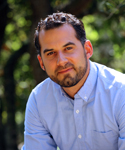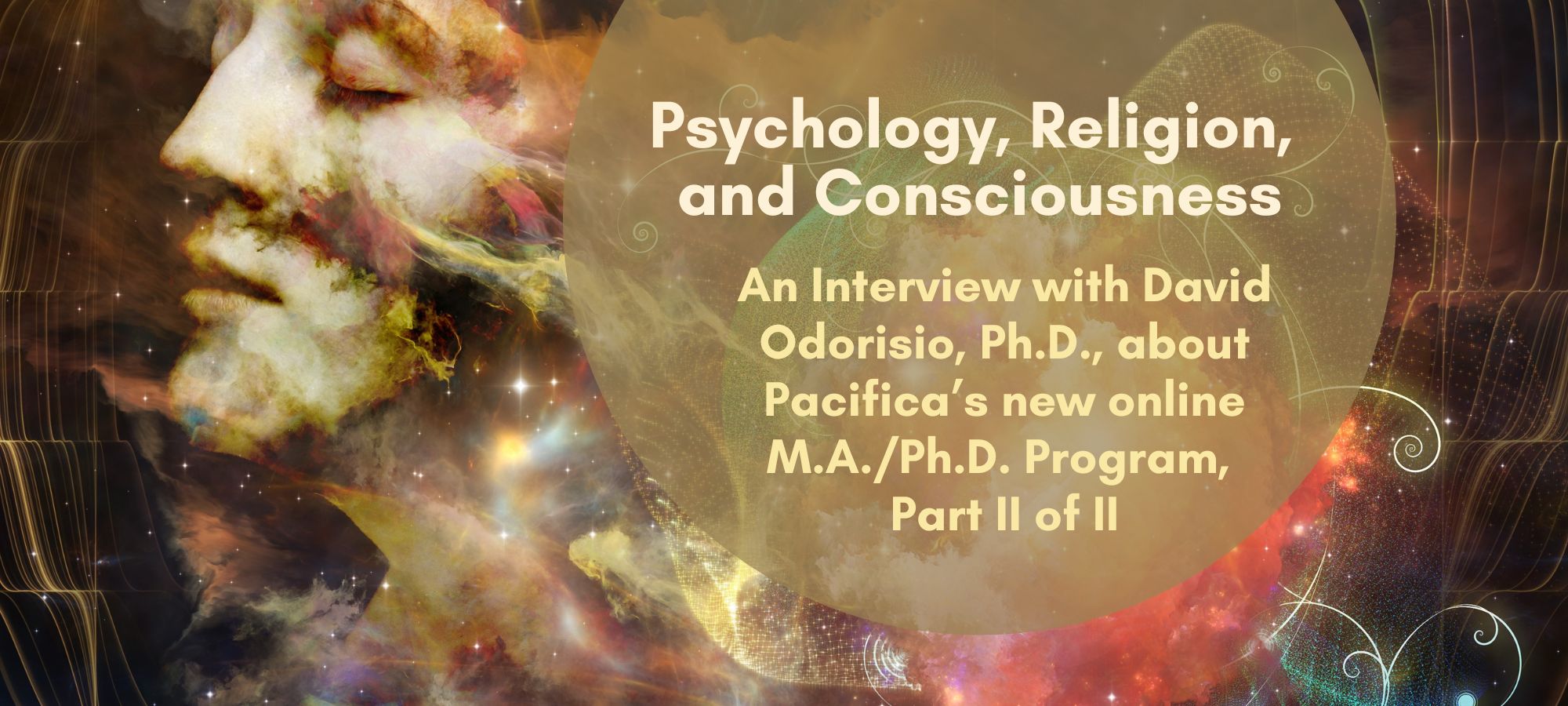David Odorisio, Ph.D., currently the Co-Chair of Pacifica’s Mythological Studies program, will be leading the launch of a new M.A./Ph.D. program in Fall 2024, in Psychology, Religion, and Consciousness. This is the final part in a two-part interview.
Angela: Could you say a little about the uniqueness of the new Psychology, Religion, and Consciousness program? Also, is it common in academic programs to encourage students to bring personal experience to scholarly inquiry about religion? How is this different from, for example, attending a divinity school?
David: Fifteen or twenty years ago, when I was first looking at Ph.D. programs, there was very little in the field of psychology and religion. There are not many accredited programs currently with doctoral degrees in psychology and religion. There are more programs emerging in consciousness studies, so that piece is growing, but as far as a unique hybrid amalgamation, this is a one-of-a-kind program. If you’re going to a divinity school, there’s an applied, pastoral component. You’re going to be trained as a minister or become ordained. Some divinity schools have a PhD program in comparative religion, but there’s still a standard narrative that you’re not supposed to bring yourself—your own personal experience—into your area of scholarship. That’s something that makes Pacifica and the PRC program unique; we encourage scholar-practitioner models. We want to integrate scholarship with actual lived experience for those practicing a spiritual path or religious tradition.
Angela: The PRC program description reads: “The study of human consciousness traverses a wide range of phenomena, including advances in the psychology of the unconscious, religious and spiritual experience, near-death experience and altered states of consciousness, the mind-matter problem, as well as the broad spectrum and phenomenology of consciousness itself. [Pacifica’s PRC program] rigorously and creatively engages with such diverse and wide-ranging phenomena, and dialogically synthesizes these vital areas of academic inquiry into a unique inter-disciplinary graduate-level education.” A few things catch my eye here. One is the altered states of consciousness. We have the upcoming “Psychedelics and Individuation: Conversations with Jungian Analysts” conference, and I know that the intersection of psychedelics and states of consciousness are of interest to many Pacifica students and faculty. Will the program encompass those kinds of inquiries?
David: We have one course in PRC that specifically focuses on psychedelics, framing it from within a transpersonal perspective, and looking at it through the lens of depth psychology. Psychedelics are one of the most fascinating topics today, as many folks are choosing to directly engage with altered states of consciousness, with the research around their potential for psycho-spiritual growth continuing to emerge. There’s a fascinating inter-disciplinary body of literature emerging across medical communities as well as religious studies, Indigenous and psychotherapeutic perspectives, so it’s a complex and dynamic field that’s deserving of on-going and sustained attention.
Angela: You mention that the enrollees will consider their own religious spiritual experiences within this program. Can you speak about that?
David: We want students to be engaged at a personal level, bringing their own perspectives and life experience, whether spiritual, religious, or spiritual-but-not-religious. Whatever frame of reference they’re coming from, we want students to feel comfortable bringing it into the program and develop critical thinking and scholarly investigation about their own beliefs as well as being exposed to those of others. We’re looking for students who are intellectually curious and spiritually engaged with some sort of personal practice. Or at least have a curiosity for it. Spiritually inclined, let’s say. And we want students from diverse backgrounds and traditions, and student-practitioners from different schools of thought and spiritual movements that might be non-traditional. We have a course that considers new religious movements, neo-pagan traditions, neo-shamanism, and plant-medicine-based traditions; all of which are and have been growing at an enormous rate.
Angela: What are you most excited about for this program?
David: I’m excited about the program in general. It’s an incredible expansion and building upon Pacifica’s history of depth psychological inquiry. It feels like a natural extension of Pacifica’s mission. I’m also excited about several new courses that I was able to develop, one is in Comparative Mysticism, which looks at mystical traditions throughout history in comparative perspective. Another is a seminar on Contemplative Spirituality, which engages students as practitioners, with an emphasis on inter-religious dialogue, for example Buddhist and Christian dialogue at the level of contemplative practice. So I’m excited personally about teaching those courses.
Angela: Thank you so much for sharing with me about this exciting new program. I look forward to watching it grow!
Enrolling for Fall 2024 Pending Approval from the U.S. Department of Education. Discover more about the program here.

David M. Odorisio, is Co-Chair and Associate Core Faculty in Pacifica’s Mythological Studies graduate degree program. David is editor of Thomas Merton in California: The Redwoods Conferences and Letters (Liturgical Press, 2024), A New Gnosis: Comic Books, Comparative Mythology, and Depth Psychology (Palgrave Macmillan, 2022), Merton and Hinduism: The Yoga of the Heart (Fons Vitae, 2021), and co-editor of Depth Psychology and Mysticism (Palgrave Macmillan, 2018). He has published in Quadrant, Jung Journal, Philosophy East and West, The Journal of Transpersonal Psychology, and The International Journal of Transpersonal Studies, among other peer-reviewed journals. He currently teaches the following courses in the Mythological Studies program: Methods and Contemporary Issues in Religious Studies; Christian Traditions; and Dissertation Formulation.

Angela Borda is a writer for Pacifica Graduate Institute, as well as the editor of the Santa Barbara Literary Journal. Her work has been published in Food & Home, Peregrine, Hurricanes & Swan Songs, Delirium Corridor, Still Arts Quarterly, Danse Macabre, and is forthcoming in The Tertiary Lodger and Running Wild Anthology of Stories, Vol. 5.


